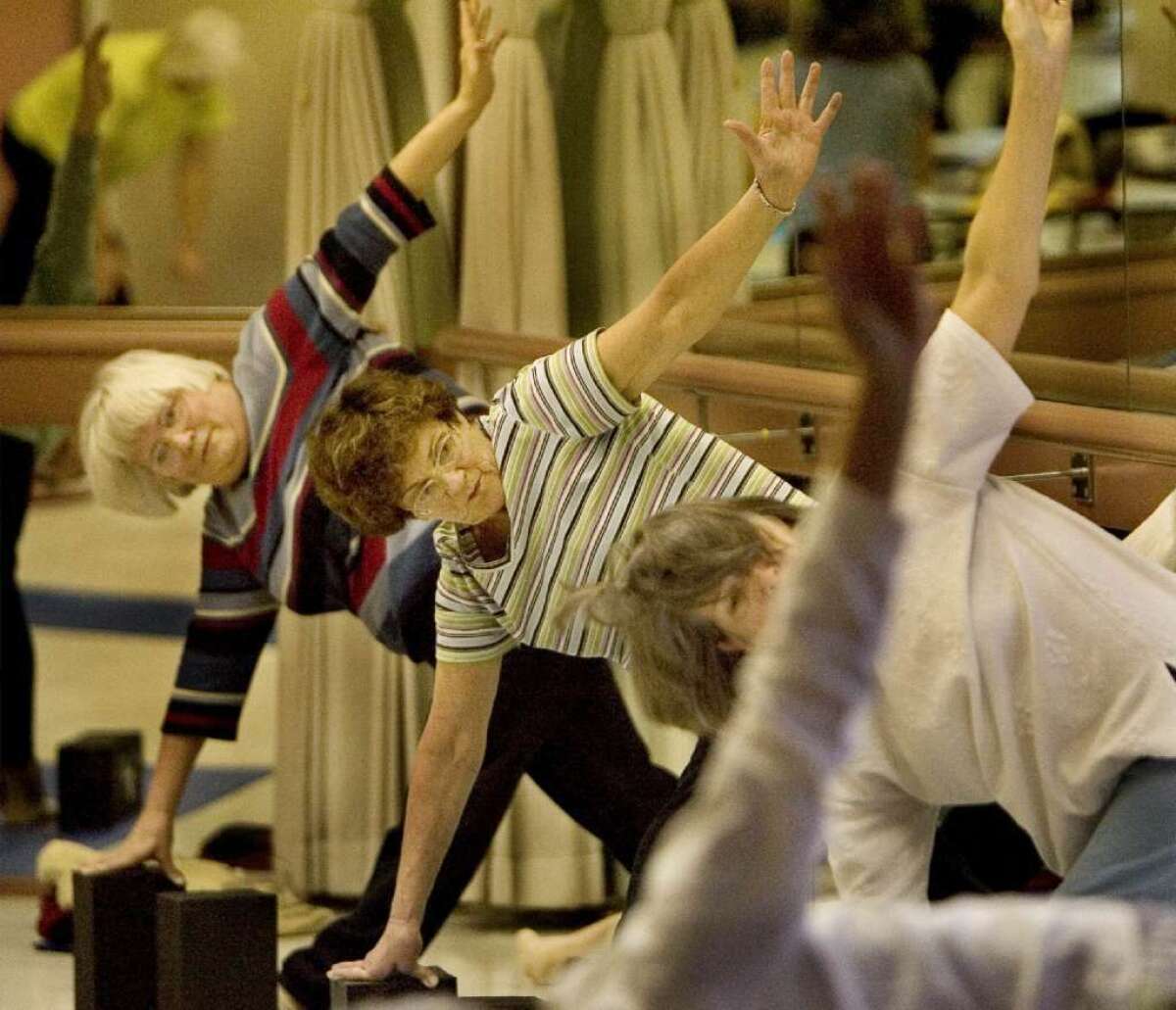Intensive exercise may keep the aging mind sharp

Exercising as you get older has many benefits, but a new study zeroes in on the mental payback exercisers reap.
Older Americans who engage in strenuous exercise are more mentally nimble, have better memory function and process information more speedily than do their more sedentary peers, new research suggests. And as they continued to age, participants who were very physically active at the start of a five-year study lost less ground cognitively than did couch potatoes, according to the study.
The latest research, published Wednesday in the journal Neurology, is the most recent study to underscore the importance of moderate to intensive exercise in healthy aging. In addition to keeping diabetes, heart disease and osteoporosis at bay or in check, a welter of studies suggests a good workout is powerful medicine for the aging brain, preventing and treating depression and shoring up cognitive function.
See more of our top stories on Facebook >>
The latest research parses out the cognitive benefits of moderate to intensive physical activity in an ethnically diverse group of Manhattanites with an average age of 71 upon entry into the study. Latinos represented roughly 60%, and 20% of the participants identified as black. Nearly half had a high school education or less. Most were followed for about five years, at the end of which their performance in a range of cognitive domains was compared with their baseline scores.
What distinguished the intensive exercisers from those with light or no leisure-time physical activity? In the previous two weeks before enrollment, they reported engaging in activities several times a week likely to get their heart rates up. Those who reported light or no leisure-time physical activity made up the remaining 90% of participants.
“If you’re thinking strolling, you’re not going to make it” into that top 10% category, said the study’s lead author, University of Miami neurologist Clinton B. Wright. “You need to do a significant amount of exercise and get your heart rate up to fit into the moderate-to-heavy category.”
When researchers looked only at subjects who had no evidence of cognitive impairment when they enrolled in the study, they found a stark difference in memory function between the highly active and those who engaged in either no leisure-time physical activity or only light intensity activity: After five years, exercisers were the equivalent of 10 years younger than the light- and non-exercisers on measures of “episodic memory” function — the ability to recall past experiences and autobiographical information.
The new research also suggests that vascular health is a key link between physical and mental fitness as we age. The health of our blood vessels is likely influenced by the exercise we do; in turn, the health of those vessels affects our mental agility as we age as well.
Specifically, researchers turned up evidence that having risk factors for stroke — most notably hypertension — effectively contributes to accelerated brain-aging. That became clear in the new study when its author adjusted for variations in participants’ vascular risk factors, measured during MRI scans administered when the participants enrolled.
When the researchers took into account participants’ vascular risk factors, they found that exercising was not as powerful a predictor of how well a person’s brain aged. A recent history of moderate to intensive exercise remained a predictor of episodic memory function and speed of processing, but the relationship became less pronounced.
That suggests that when the tiny blood vessels that supply oxygen throughout the brain are in good condition, cognitive impairment and its scary older sibling, dementia, are less likely to take hold. Regular exercise, which is known to keep blood vessels throughout the body in good condition, may indirectly help to minimize the cognitive decline that comes with age.
Wright cautioned that its design does not allow one to draw a direct causal line from exercise to brain aging, even if it stops along the way at vascular health. But he said that a person who engages in intensive exercise is both less likely to have hypertension, high cholesterol, diabetes and a history of smoking and more likely to have acted to mitigate them if they develop.
That fact will likely make his or her vascular health better and make his or her brain more resilient against the effects of aging, Wright said. Exercise might also facilitate the release of hormones that protect the brain as it ages, he added.
Mayo Clinic cardiologist Virend Somers said the new research may not illuminate direct relationships between exercise and cognitive aging, however. It may show, as many observational studies do, that cognitively healthier people are more likely to engage in healthy behaviors, such as exercise, that in turn maintain their brain health.
But Somers said that added to other studies that strongly suggest a link between regular exercise and brain health, the study makes a good case for exercise.
“Given its cost-free nature and the myriad other benefits of exercise, I think we should assume it helps until definitively shown otherwise,” said Somers. “We do know it’s going to lower blood pressure, lower cardiovascular risk, maintain lean muscle mass and counter against frailty.”
Somers added that for many, such exercise is a social occasion. And research suggests that social interaction is the antidote for isolation and loneliness, which can be cognitively toxic and is linked to higher rates of dementia.
Even if a person doesn’t have improvement in cognitive function, “exercise has all these other things going on,” Somers added. “My bias would be to say it probably does help cognitive function. But there are so many healthy benefits, it’s worth the intervention,” he added.
Follow me on Twitter @LATMelissaHealy and “like” Los Angeles Times Science & Health on Facebook.
MORE SCIENCE NEWS
Study finds acetaminophen to be useless in relieving osteoarthritis pain
Study tallies the payback for humans and planet of eating more plants and less meat
To save native island animals from extinction, eradicate the uninvited guests, study finds




